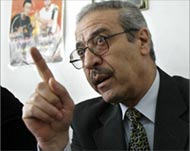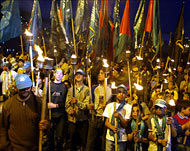Palestinian politicians eye alliances
Various Palestine Liberation Organisation (PLO) factions are exploring the idea of forming a united nationalist-democratic front to challenge the Islamist resistance group, Hamas, in upcoming elections.

The idea was floated recently when Palestinian Authority (PA) President Mahmud Abbas proposed the entire occupied Palestinian territories, including the West Bank, East Jerusalem and Gaza Strip, be considered a single electoral district, very much like the Israeli electoral system.
Abbas, who is also head of Fatah – in effect the ruling party of the PA – thinks a united PLO front would put up a serious challenge to Hamas.
This view is generally shared by leaders of the three main Palestinian leftist factions, namely the Popular Front for the Liberation of Palestine (PFLP), the Democratic Front (DFLP) and the Palestine People’s Party (PP).
The Palestinian National Initiative, headed by former presidential candidate Mustafa al-Barghuthi, accepts the idea in principle, but says that any Fatah-leftist front must ensure the secular party be treated as an equal rather than subordinate to Fatah.
Obstacles
An analysis of the partisan map in the occupied Palestinian territories suggests that putting the idea into effect will not be easy.
There are two main obstacles: First, the controversial election law, approved by the Fatah-dominated Palestinian Legislative Council in its second reading last week.
 |
|
Taysir Khalid of the DFLP says |
According to the amended law, two-thirds of MPs will be elected within their regional districts, while the remaining one-third are to be elected at the national level, either as members of political parties or as independents.
This system, says Taysir Khalid, a leader of DFLP and former presidential candidate, would make the idea of a united PLO list meaningless.
“This system closes off all opportunities for a united nationalist front since it would reinforce tribal considerations at the expense of national considerations,” he said.
Tribal allegiances
A majority of Fatah MPs in the legislative council is opposed to the idea of making the entire occupied territories a single electoral district, and is resisting the adoption of the so-called 50-50 system according to which half the MPs are elected in regional districts while the other half are elected at the national level.
|
“I think our brothers in Fatah would have to give up their traditional condescending attitudes toward other PLO factions” Taysir Khalid, a leader of the Democratic Front for the Liberation of Palestine |
Several Palestinian commentators have criticised Fatah’s attachment to the tribal and local constituency systems, accusing Fatah MPs of giving more attention to what they call parochial self-interests than national ones.
However, some MPs have argued that tribal realities play an undeniable fact and that it was more appropriate to deal with these realities on their own merits.
The second obstacle is the lingering mutual suspicion between Fatah and the smaller leftist groups, whose power and influence waned after the collapse of the former Soviet Union and the emergence of Hamas in the late 1980s.
Mistrust
Khalid says there is a bitter legacy between Fatah and its erstwhile partners in the PLO.
 |
|
Local leader Mahmud al-Zahar |
“I think our brothers in Fatah would have to give up their traditional condescending attitudes toward other PLO factions. Fatah’s propensity to hegemony has always hindered the creation of a broad national front,” he said.
He argued that, while Abbas’s intentions were good, the formation of a united list would require a modern, democratic election law that would prepare the foundations for a genuine partnership between Fatah and the leftist groups.
Among Fatah’s rank and file there is little enthusiasm for an election front.
Some Fatah leaders, such as Diab al-Luh of Gaza, believe the left stands to take too much from Fatah and give too little in return.
“I think it is better for us and them to contest the elections separately. A coalition or any form of cooperation would have to wait until after the elections,” al-Luh told Aljazeera.net.
Third force
Some leftist leaders are again contemplating forming a coalition of all leftist factions and independents which would serve as an alternative to Hamas and Fatah.
 |
|
Hamas has increasingly gained |
This is what al-Barghuthi is working to accomplish. He told Aljazeera.net that nearly 45% of Palestinian voters were neither for Hamas nor for Fatah.
“This is the silent majority which we represent,” he said.
However, according to the latest poll conducted by the Palestinian Centre for Public Survey and Research (PCPSR), public support for all Palestinian leftist groups combined, including al-Barghuthi’s Palestine National Initiative, does not exceed 2.4%.
Hamas unconcerned
Hamas chief leader in the Gaza Strip, Mahmud al-Zahar, is unfazed by a united front saying such prospects are expected, but harmless.
“In Palestine, like elsewhere, the left has receded to insignificance,” he said. “A Fatah-leftist alliance does not unsettle us,” al-Zahar told Aljazeera.net.
Al-Zahar pointed out that Hamas was not overly concerned about the outcome of the upcoming elections, arguing that the important thing was to lay the foundations of a sound and strong democracy in Palestine.
Meanwhile, the head of the Palestinian Election Committee, Ammar Dwaik, told Aljazeera.net that nominations for the legislative elections would begin on 5 June, nearly six weeks before election day.
Dwaik said an election fee of $1000 for independent candidates and $6000 for electoral lists would be charged upon registration.
He said the election committee would try to overcome problems associated with the voter registrar by re-opening voter registration on 7 May to enable unregistered voters to register their names.
This, he said, would ensure the organisation of transparent and democratic elections.